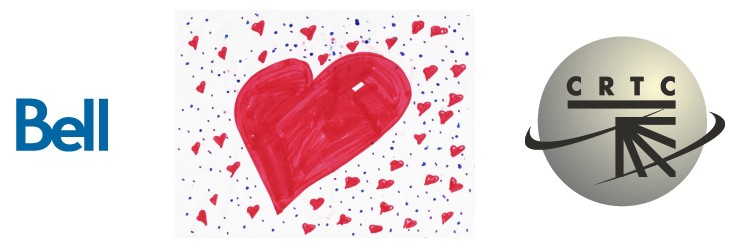 One day before the Federal Communications Commission in Washington announced draft guidelines to establish an American Net Neutrality policy, the Canadian Radio-television Telecommunications Commission (CRTC) announced its own guidelines to govern what Canadian broadband providers can and cannot do with the Internet traffic they deliver to millions of Canadian consumers. While Bell (Canada), the nation’s largest telecommunications company praised the CRTC for its provider-friendly ruling, consumer groups varied their responses from “a step in the right direction” to “weak” to “here comes more gouging.”
One day before the Federal Communications Commission in Washington announced draft guidelines to establish an American Net Neutrality policy, the Canadian Radio-television Telecommunications Commission (CRTC) announced its own guidelines to govern what Canadian broadband providers can and cannot do with the Internet traffic they deliver to millions of Canadian consumers. While Bell (Canada), the nation’s largest telecommunications company praised the CRTC for its provider-friendly ruling, consumer groups varied their responses from “a step in the right direction” to “weak” to “here comes more gouging.”
The CRTC Net Neutrality policy for Canada essentially permits providers to continue to throttle broadband speeds for both retail and wholesale customers, and block traffic altogether should the CRTC grant permission in “exceptional cases,” as long as the provider discloses the practice to consumers up front, and warns them in advance of any policy changes that further slow their connections.
Laurel Russworm, who runs Stop Usage Based Billing, was not pleased.
“The CRTC decision doesn’t have a silver lining I can find; in fact they essentially said that usage based billing and caps are good tools to use to fight congestion. All Bell Canada has to do is warn us first, then they can gouge as they please. They’ve deferred making a decision on usage based billing until after the court challenges are dismissed, but I’m not holding my breath,” Russworm wrote.
On Wednesday the CRTC decided that Internet providers in Canada need measures to manage the traffic on their networks at certain times to deal with what providers claim to be a congestion problem. At hearings held this past summer, several CRTC commissioners were receptive to the claims providers made that Canadian broadband does not have the capacity their American neighbors have. Providers like Bell and Rogers claim that peer to peer traffic and increasing consumption of high bandwidth services have created capacity shortages on their networks, requiring traffic management which artificially slows certain traffic on their networks at “peak times.” Canadian broadband providers almost universally also impose Internet Overcharging schemes on their customers, limiting customer use and charging them overlimit penalties for exceeding usage allowances.
The commission accepted the providers’ claims and gave the green light to those practices, but said before a provider literally blocks access to online services, or throttles time sensitive traffic on services like Voice Over IP telephone or two-way video conferencing to the point it becomes “degraded,” it needs to get Commission permission first.
Mirko Bibic, Bell Canada’s senior vice-president of regulatory and government affairs, told The Globe and Mail the ruling gives carriers the right to run their businesses the way they see fit. “We’re the experts, and we get the flexibility to determine how to manage our networks to give the user the best experience,” he said.
Bell already “throttles” its Internet service by slowing peer-to-peer downloading between 4:30 p.m. and 1 a.m. to make sure the network is not overloaded by a relatively small number of people transferring large video and music files.
Independent Internet providers are among the biggest proponents of Net Neutrality, and a ban on Internet Overcharging schemes known in Canada as “usage based billing.” Many Canadian broadband providers obtain connectivity through wholesale accounts purchased from Bell. The Canadian phone giant imposed both speed throttles and usage based billing on their wholesale customers. Those costs, and the speed bumps that go with them, are now increasingly passed on to consumers. Independent providers fear being put out of business.
For many of them, Wednesday’s decision might as well never have happened.
“This has really not changed anything,” Tom Copeland, chair of the Canadian Association of Internet Providers, told PC World.
Copeland said the “biggest, most glaring omission” from the ruling is the lack of restraints on the time of day or how long suppliers like phone or cable companies can manipulate traffic. “So we could continue to see traffic management every day of the year,” he said.
“We’re still not addressing the cause of the problem,” he added: “Either weak points in the network, or abuse by users.” Most casual users of peer-to-peer applications — the biggest offending programs in the eyes of providers – aren’t the problem, he said.
“We just went backwards at warp speed,” lamented John Lawford, counsel for a coalition of consumer groups that fought for an end to throttling of Internet traffic of consumers, “ while we watch the U.S. rocket ahead.”
“The CRTC has said in this decision that ISPs own your content and own your Internet connection” said Lawford, “You just got owned.”
The Public Interest Advocacy Centre represented the Consumers’ Association of Canada, Canada Without Poverty and Option consommateurs during the hearings on Net Neutrality. PIAC argued that the Telecommunications Act required ISPs not to interfere with customers’ Internet traffic unless such traffic was clearly harming other users of the network and not otherwise. “ISPs should act as common carriers and just carry traffic, not as broadcasters deciding what you watch” continued Lawford, “but now they can decide what gets through – and how much they get to charge you for the privilege.” Lawford also noted the CRTC’s requirement for the ISPs to disclose their “Internet traffic management practices” will not actually stop any of the practices.
The CRTC has repeatedly taken broadband industry-friendly positions in direct opposition to Canadian consumer interests, helping to set the stage for Canada’s rapid decline in broadband leadership. The country’s standing in broadband rankings has taken a stunning fall from its earlier top-shelf position. Regulatory policies that permit abusive, anti-competitive practices and reward providers for rationing broadband instead of investing in expanding it are at the heart of the problem.
Since the CRTC has taken positions more worthy of a industry trade group than an independent regulator, an increasing number of Canadians are demanding the CRTC lead or get out of the way. A large group of Canadian voters upset about any issue is sure to attract politicians, and the New Democratic Party of Canada (NDP) has arrived.
Charlie Angus, New Democrat Digital Affairs Critic and MP for Timmins-James Bay, who already is on record opposing Internet Overcharging schemes, says the CRTC dropped the ball on Net Neutrality.
“Yesterday’s CRTC decision on Internet traffic-management practices is a blow to the future of digital innovation in Canada,” Angus said in a statement.
“This interference [from traffic management] will be bad news for small third-party competitors and leaves consumers subject to digital snooping and interference from cable giants,” he added.
“Basically the CRTC has left the wolves in charge of the henhouse. ISP giants have been given the green light to shape traffic on the internet in favor of their corporate interests,” he said. “This decision is a huge blow to the future competitiveness of the Internet.”
Angus says that the premise of today’s decision – that notification from the ISP will allow customers to make an informed decision on where to buy Internet service – misses the harsh reality that the market for Internet service in Canada is not nearly competitive enough to work.
“Canada has fallen to the back of the pack in Internet service provision and pricing after leading the way for years. This is the direct result of a small band of ISP giants blocking out competition,” Angus said. “This decision clears the way for ISPs to squeeze out third-party players who are attempting to provide better price and service options.”
South of the border, the FCC has taken clear steps toward the establishment of Internet neutrality on U.S. networks.
Angus said that principle of Net Neutrality should be at the center of Internet policy in Canada, and that the CRTC has missed a golden opportunity with yesterday’s decision.
“The principle of Net Neutrality must be a cornerstone of the innovation agenda. The CRTC has once again acted as the rubber stamp for large ISP and cable players to dominate the market and decide which traffic goes in the fast lane and which traffic gets stuck in the slow lane. This decision continues a long and dismal tradition of Canada’s communication policy decisions chipping away at the public interest to the benefit of a few corporate giants.”
Dissolve the CRTC, a group collecting signatures to petition for the closure of the Commission, also made several comments about the CRTC decision.
Among their conclusions:
- The new policy leaves the door open to providers deciding their economic interests are better served from traffic management practices like throttles and usage limits than network investments. Short term limits may serve the interests of stockholders, but could discourage long term investments needed to create new 21st century broadband platforms;
- The Commission’s encouragement that providers make additional investments in their networks is likely to fall on deaf ears. It was Bell’s lack of investment in their broadband network which led to the traffic management practices, and the recent hearings about them, in the first place. Without mandates, there is no real pressure on Bell to change their investment strategy.
- The Commission’s policy to regulate this issue through a user complaint process that calls out bad actors has no historical precedent of working. The CRTC has a long history of ignoring public involvement in telecommunications proceedings, and does not like to involve themselves with individual customer complaints. Campaigns to flood the CRTC with complaints on specific issues using their language may be the only way to get them to investigate. Additionally, complaints that call out the disparity in network management policies between wholesale and retail accounts may only lead to additional restrictions on both types of accounts, making a bad situation even worse.
Canadians must contact their elected officials and demand federal legislation to enact true consumer protection and broadband reform policies to restore Canada to a position of leadership in broadband. The CRTC is ineffective and must not be the final arbiter on these important issues.


 Subscribe
Subscribe



